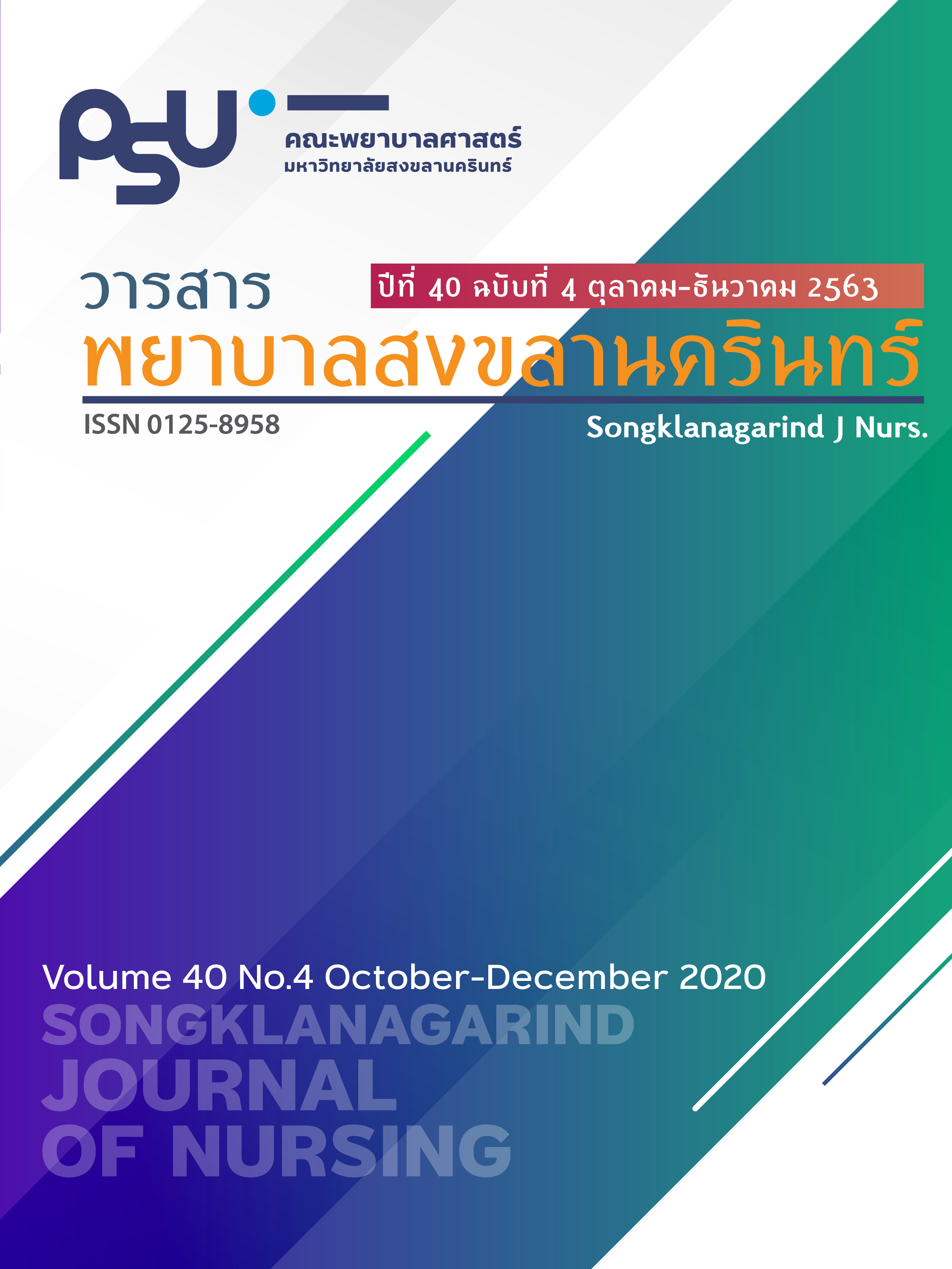Effect of Self-Management Program on Self-Efficacy, Self-Management Behaviors, Fasting Plasma Glucose, and Hemoglobin A1C among Type 2 Diabetes Mellitus Patients
Main Article Content
Abstract
This quasi-experimental research aimed to compare self-efficacy, self-management behavior, fasting plasma glucose (FPG), and hemoglobin A1c (HbA1c) of type 2 diabetes mellitus patients (T2DM) in the experimental group and the control group. T2DM patients were divided into 2 groups, consisted of 43 patients per group. The control group received self-management program for 12 weeks while the control group received the usual care. The instrument included: 1) self-management program, 2) self-efficacy questionnaire, 3) self-management questionnaire, and 4) record form of blood glucose level and HbA1c. Data were analyzed by descriptive statistics, independent t-test, ANCOVA, and paired t-test. The result revealed that after the experiment, comparing within group demonstrated that the experimental group had the mean score of self-efficacy (t = -6.543, p < .05) and FPG were significantly improve than prior experiment (t = 3.555, p < .001) whereas HbA1c was not significant difference between prior and after experiment. While comparison between group, it was found that the mean score of self-efficacy of the experimental group and the control group were not significance difference (t = -0.183, p = .855). Whereas self-management behavior (t = -2.498, p = .05), FPG (t = 5.010, p < .001), and HbA1c (t = 4.549, p < .001) were significantly improve when compare to the control group. This study results should be used with cautions due to its flaw limitation of the non-controlled confounding factors.
Article Details
References
World Health Organization. (WHO) [Internet]. Global report on diabetes;2016 [cited 2017 Nov 10]. Available from:https://apps.who.int/iris/bitstream/handle/10665/204871/9789241565257_eng.pdf;jsessionid=946E9AF579864 B12422CFFEDFA3431B6?sequence=1
Potisat SA. Review of the current situation and the form of chronic non-communicable diseaes services Medical Technology Research and Evaluation Institute, Department of Medical Services Ministry of Public Health; 2014. Thai.
Yan Zheng, Sylvia H, Frank B. Global aetiology and epidemiology of type 2 diabetes mellitus and its complications. Nat Rev Endocrinol. 2018; 14(2): 88-98. doi: 10.1038/nrendo.2017.151.
Diabetes Association of Thailand under the patronage of her royal highness princess Maha Chakri Sirindhorn. diabetes practice guidelines. Bangkok: Arun Printing; 2014. Thai.
Powers MA, Bardsley J, Cypress M, et al. Diabetes Self-management Education and Support in Type 2 Diabetes: A Joint Position Statement of the American Diabetes Association, the American Association of Diabetes Educators, and the Academy of Nutrition and Dietetics.Diabetes Care. 2015; 38(7): 1372-82.
Wattana C. Self-management support: Stratgies for promoting disease control. Journal of Phrapokklao Nursing College. 2015; 26(Suppl 1): 117-27. Thai.
Buathongkhamwisat P, Pinchaleaw D, Moolsart S. The effectiveness of self-management program on type 2 diabetic patients in Thakor, Maesuai diabetic, Chingrai Province. JOPN. 2017; 9(1): 105-16. Thai.
Chrvala A, Sherr D, Lipman RD. Diabetes self-management education for adults with type 2 diabetes mellitus: A systematic review of the effect on glycemic control. Patient Educ Couns. 2016; 99(6): 926-43. doi: 10.1016/j.pec.2015.11.003.
Kanfer FH, Gaelick L. Self-management methods. In: Kanfer FH, Goldstein AP, editor. Helping people Change. New York: Pergamon Press; 1988.
Kongsakul S. The effect of a skill training program on self-management towards selfmanagement behavior in diabetes control and water levels blood sugar of those who have type 2 diabetes [Thesis]. [Bangkok]: Thammasat University; 2009. 184 p.
Creer LT. Self-management of chronic illness. Handbook of self-regulation. San Diego, CA: Academic Press; 2000
Chirawatkul A. Biostatistics for health science research. Department of Biostatistics and Demography Faculty of Public Health Khonkaen University; 2010. Thai.
Pintana Y, Kitreerawutiwong N. Effects of the self-management program on selfmanagement behaviors among Type 2 Diabetes Mellitus patients. Journal of Nursing and Health Sciences. 2018; 12(1): 72-83. Thai.
Phetarvut S, Watthanayu N, Suwonnaroop N. Factors predicting diabetes self-management Behavior among Patients with Diabetes Mellitus Type 2. J Nurs Sci. 2011; 29(4): 18-26. Thai.
Bandura A. Self-efficacy: the exercise of control. New York: W. H. Freeman and Company; 1997.
Arda Sürücü H, Büyükkaya Besen D. Predictors of empowerment in individuals with Type 2 Diabetes Mellitus. J Transcult Nurs. 2018; 29(6): 506-13.
Yan J, Su R, Ao D, et al. Genetic variants and clinical relevance associated with gestational diabetes mellitus in Chinese women: A case-control study. J Matern Fetal Neonatal Med. 2018; 31(16): 2115-21. doi: 10.1080/
2017.1336225.
Nathan DM, Turgeon H, Regan S. Relationship between glycated haemoglobin levels and mean glucose levels over time. Diabetologia. 2007; 50(11): 2239-44. doi: 10.1007/s00125-007-0803-0.
Mekvanich N. The Relationship between Fasting Plasma Glucose and Hemoglobin A1c for Creating Average Plasma Glucose Chart in Diabetic Patients of Pranangklao Hospital. J Med Tech Assoc Thailand. 2014; 42(2): 4974-89. Thai.
Carpenter R, DiChiacchio T, Barker K. (2018). Interventions for self-management of type 2 diabetes: An integrative review. Int J Nurs Sci. 2018; 6(1): 70-91. doi: 10.1016/j.ijnss.2018. 12.002


